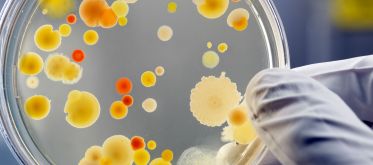
Sophia Antipolis Laboratory
Laboratory Director: Marie-Pierre Rivière
Address: Les Templiers - 105, route des Chappes - 06902 Sophia Antipolis, France
Email: contact.sophia@anses.fr
Team: around 30 people, spread out across two research units
The laboratory's missions
The Sophia Antipolis laboratory has a staff of around thirty people, working in two research and reference units and an administrative and financial department.
Established since its inception in Provence-Alpes-Côte-d'Azur, a region in the south of France, the laboratory is dedicated to bee health and animal Q fever.
It develops reference, research and surveillance activities, which are all closely linked, in these two areas. Its main activities fall within several of the Agency's strategic themes: animal health and welfare, epidemiology and surveillance, exposure to and toxicology of chemical contaminants (bee health) and, to a lesser extent, food safety (quality and safety of honey).
To know more about the Laboratory
>> See the leaflet (PDF)
>> 2020 Activity Report (PDF)
Latest laboratory news
Marie-Pierre Rivière appointed Director of the ANSES Sophia-Antipolis Laboratory
Marie-Pierre Rivière was appointed Director of the ANSES Sophia-Antipolis Laboratory on 1 August 2025. With a PhD in cellular and molecular biology, she has devoted her career to studying host-pathogen interactions; ever since she joined ANSES, her work has focused on bee health at the French, European and international levels.
The laboratory's units
Animal Q Fever Unit
The unit contributes to the control and monitoring of Q fever in ruminant livestock (cattle, sheep and goats) and provides support for risk management in the event of clustered human cases.
Q fever is an abortive disease of ruminants caused by the strictly intracellular bacterium Coxiella burnetii. This often underestimated zoonosis (a disease that can be transmitted to humans) is widespread around the world. In terms of epidemiology, sporadic cases are regularly detected in France, sometimes with disease outbreaks. A large-scale outbreak occurred between 2007 and 2010 in the Netherlands (more than 3,000 human cases in three years), linked to the rapid growth of intensive goat farms close to housing.
The research carried out by the unit seeks to develop the tools and knowledge needed to assess and control the risks to humans and animals caused by C. burnetii. It has a Level 3 containment laboratory for this purpose.
The unit is the national and World Organisation for Animal Health (WOAH) reference laboratory for Q fever.
Bee Diseases Unit
The Bee Diseases Unit works in two different areas: chemical contaminants, and infectious and parasitic diseases affecting bees, within which it develops activities calling on several scientific disciplines (bacteriology, parasitology, virology, entomology and epidemiology). It has an experimental apiary.
The unit's work follows a comprehensive approach to studying and assessing the risks generated by the multiple stress factors affecting bees.
The unit holds 6 reference mandates: it is the national reference laboratory (NRL) on bee health and associate NRL on pesticides, as well as the European Union reference laboratory (EURL) on bee health. It also has a reference mandate from the World Organisation for Animal Health (WOAH) for six bee diseases.
Partnerships
Local and regional partners
The laboratory is a host laboratory for the Graduate School for Life and Health Sciences at Nice Sophia Antipolis University, and welcomes students on BTS, vocational degree, master and doctorate courses.
It is a member of the CORSUD network of research organisations in the southern Provence-Alpes-Côte d'Azur region.
In 2020, the laboratory's Bee Diseases Unit became part of the "PrADE" (Protection of bees in the environment) joint technology unit coordinated by the Technical and scientific institute for beekeeping and pollination (ITSAP).
Through its Animal Q Fever Unit, the laboratory is also in close contact with the National Reference Centre for Coxiella (the bacterium responsible for Q fever), hosted by the Méditerranée-Infection university hospital institute, with which a scientific cooperation agreement was signed in 2020 with a view to strengthening the "One Health" approach.
National partners
- CIRAD (French Agricultural Research Centre for International Development)
- Directorate General for Food (sub-directorate for animal health and protection, office for inputs and public health in livestock farming, sub-directorate for food policy, office for coordination of chemical and physical contaminants, health emergencies unit (MUS), office for laboratories (BL))
- Oniris (Nantes National Veterinary School)
- GDS France
- INRAE (French National Research Institute for Agriculture, Food and the Environment)
- IDELE (French Livestock Institute)
- Champollion National University Institute
- Institut Pasteur French Guiana
- French Natural History Museum
- National epidemiological surveillance platform for animal health (ESA)
- Terres Inovia (Technical institute for producers of oilseeds, protein crops, hemp and their sectors)
- University of Lyon
- VetAgroSup
- Santé Publique France
- Reagent manufacturers
- Departmental laboratory networks
- Decentralised State Services: DDCSPPs (departmental directorates for social cohesion and population protection) and DDPPs (departmental directorates for population protection)
- Field veterinarians
European and international partners
- APHA (Animal and Plant Health Agency), United Kingdom
- Bundeswehr (Armed Forces), Germany
- European Commission
- CVI (Central Veterinary Institute), The Netherlands
- DTU-VET (Danmarks Tekniske Universitet), Denmark
- EFSA (European Food Safety Authority)
- Faculty of Veterinary Medicine of Coimbra, Portugal
- FLI (Friedrich-Loeffler Institut), Germany
- PIWET (National Veterinary Research Institute), Poland
- PZH (National Public Health Institute), Poland
- Sciensano, Belgium
- Statens Serum Institut Danemark
- SVA (National Veterinary Institute), Sweden
- National Reference Laboratories in European countries
Both units also have frequent contact with teams from various third countries (Benha Veterinary Faculty (Egypt), Bocutatu Veterinary Faculty (Brazil); University of California at San Diego (USA), etc.), in particular via the mandates of the World Organisation for Animal Health held by the laboratory.




